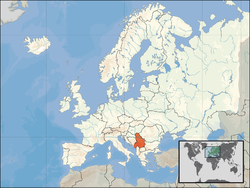| UN Security Council Resolution 1326 | ||
|---|---|---|
 Federal Republic of Yugoslavia (2000) | ||
| Date | 31 October 2000 | |
| Meeting no. | 4,215 | |
| Code | S/RES/1326 (Document) | |
| Subject | Admission of new Members to the UN: Federal Republic of Yugoslavia | |
| Result | Adopted | |
| Security Council composition | ||
Permanent members | ||
Non-permanent members | ||
| ||
United Nations Security Council resolution 1326, adopted without a vote on 31 October 2000, after examining the application of Federal Republic of Yugoslavia for membership in the United Nations, the Council recommended to the General Assembly that Yugoslavia be admitted. [1]
Contents
In 2003, the Federal Republic of Yugoslavia was continued as Serbia and Montenegro. After Montenegro became a sovereign state in 2006, the United Nations member of Serbia and Montenegro was continued as the Republic of Serbia. Thus, Serbia is the successor state to the Federal Republic of Yugoslavia (and Serbia and Montenegro) in the United Nations.